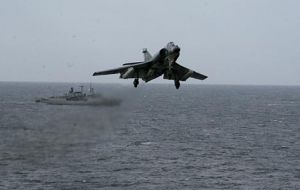MercoPress. South Atlantic News Agency
Falklands’ war air battles marks record rating in Argentina
 The film reveals the performance of the Argentine Air Force
The film reveals the performance of the Argentine Air Force History Channel established a new record audience rating in Argentina with the June release of “1982: Malvinas, the war from the air”, an original production from the channel which chronicles the clash of the Argentine Air Force with the British Task Force sent to recover the Islands.
According to television viewers’ pollster IBOPE, the Malvinas war release had the second highest rating of cable television among adult viewers over 18 in Argentina and the fourth highest in the pan-region for the same age segment.
This according to History Channel positions “1982: Malvinas, the war from the air” as the channel’s original production with the highest audience in Argentina together with “Projekt Huemul: The Fourth Reich in Argentina” and the story of a famous Argentine comedian, Alberto Olmedo.
“The inclusion of contents such as Malvinas has been most successful in terms of ratings for History channel and we continue to consolidate our position in the region” said Eduardo Ruiz Executive Vice-president and General Manager for A&E Ole Networks for Latinamerica.
The release, a 90 minute special, tells the story of the air battle between the Argentine Air Force and British air and naval forces mainly appealing to testimonies from Argentine pilots and experiences that remained unknown for over a quarter of a century. The 1982 Falklands conflict was considered the last example of conventional air and sea battling of the last century. Much of the film has state of the art digital animation.
Following on the success of “1982: Malvinas, the war from the air”, History channel has produced “Amia: the cause” to be presented by renowned historian Carlos de Napoli. The document refers to the bombing on July, 1994 of a Jewish organization in Buenos Aires, one of the deadliest terrorist actions in South America allegedly related to the Middle East conflict. The bombing killed at least 85 people and injured and maimed hundreds




Top Comments
Disclaimer & comment rules-

-

-

Read all commentsAlthough actual images of real war are not my preference, this video-film I watched on the 14th ultimo and was again shown by The History Channel one or twice, later on, avoids showing death as much as possible and is therefore suitable to be watched by anyone 12 y.o. or more.
Jul 14th, 2009 - 02:35 am 0To my humble point of view, Argentina's “recovery” feat was doomed from the very moment it was decided by the de-facto military goverment officialdom who wanted to “show the people that it may be done”, with the sole pupose of staying in power. Unfortunately, booze does not help thinking much, and we were all messed up into this deadly & foolish confrontation which ruined decades of reciprocal goodwill and even friendship.
To add suffering to pain, hours before the British arrived to the arcipelago's waters, our military flatly rejected a three-flag UN peace proposal which would have given Argentina a strong foothold into the islands' government and, with time, who knows...
The film shows not the land armies' actions, but instead the brave Argentine pilots' performance, doing the best they could with their vintage and badly cared for aircraft, their scarce ammo & bombs (some of the latter could have been sold to museums as collectors' pieces) and only a handful of good French-made Mirage fighter-bombers armed with a score of ultimate-generation air-to-air missiles, the Exocets, adapted to the Mirages - in a hurry - by Argentine engineers, since these missiles were never shot before. With those flying machines and unbelievable courage and skills, our pilots managed to sink and damage a fair number of enemy ships, thus delaying the British landing as much as possible. The reel shows and/or re-creates many of these sorties.
At the end of the film, an air force man makes a balance of material costs incurred, comparing the prices of our aircraft material casualties and those of the Class 21 frigates and other vessels and aircraft that were lost by the other side. I feel that this was in very bad taste because the loss of each Argentine plane - junk actually - was almost always accompanied by the loss of a brave, resilient pilot, who offered heroically his life for nothing but the ethylic-inspired whims of the leader of a bunch of military scoundrels.
Post scriptum: And the winner takes it all! The Argentine military left the government for good and for ever (in a way, the certainty that they'll never again rule our lives was a consolation prize) , while on the other side, 2500 miles to the North-east...
Jul 14th, 2009 - 02:52 am 0the war fires tempered the iron of which one lady was made of
http://www.guardian.co.uk/commentisfree/2009/jul/13/british-party-electoral-system-votes
Argentina's defeat in the Falklands (Malvinas) war was one notch more in the steep decline that country has experienced. Argentines have been very unlucky with their governments (military rulers and the autocrat type as the Kichners). It's sad to see a country going down the drain but Argentines are the only ones to blame for their problems.
Jul 17th, 2009 - 07:25 pm 0Commenting for this story is now closed.
If you have a Facebook account, become a fan and comment on our Facebook Page!